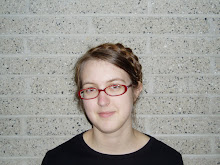23 hours ago
Monday, April 7, 2008
the aspiring intellectual falls short once again
So, I lied. Spinning/geekery to follow. David Broockman posted some thoughts on marriage and family, set off by his sister's recent wedding. I started this as a comment on his blog, and then realized that it was turning into one of those post-lecture questions asked by long-winded academics who preface their question with a summary of either their dissertation or their forthcoming book.
Heather K. Love gave a talk for this year's Sager Symposium about the word "queer": what it promised, what it has achieved, and what it has become. She discussed "queer" as insult-turned-memorial, the use of which by queer people serves to remind people (primarily, I suspect, other queers) of the history of violence and hardship experienced by homosexuals. In the question and answer session following her talk, she mentioned in passing that she doesn't think of gay families-- or being a gay parent raising children-- as queer. Instead, gay parenting is just parenting. This statement rang true to me, although perhaps only because I think of parenting as being so child-focused. Kids have to be raised somehow, by someone, and I think the how matters much more-- to children and society at large-- than the one. But if there is nothing queer about gay parenting, is there anything "queer"-- political, radical, different-- about gay marriage? Professor Love and, indeed, my own convictions abandon me here, as they have reservations about marriage itself as an institution-- hers based on Marxist and feminist scholarship, mine based on simplistic observation and deduction. My hot head is on its own.
As I write this (revisions are for pansies!) I am becoming increasingly worried that I won't be able to answer my question (that's the one about queerness and marriage, towards the end of the previous paragraph) without defining what Peter Johnston at the Yale Daily News calls "the foundational character of marriage." He dismisses the possibility of marriage as "'a public expression of love'," but phrasing "a unique relationship set apart from all others" in economic terms doesn't quite work either. If marriage were a contract between two individuals for the benefit of their purses, of the national economy, of societal stability, or of their children, then who is to say that two same-sex best friends or complete strangers could not be married? And if marriage is a contract for the benefit of society, etc. predicated on two individuals being in love, then wouldn't no longer being in love almost require a divorce-- and he is very down on divorce-- lest marriage become an economic contract? And if same-gender people can fall in love, raise children, contribute to the economy, and comfortably settle in middle-class suburban neighbourhoods, then why shouldn't they marry? Please, philosophers, find the faults in my reasoning.
But I digress. Johnston posits that "if proponents would focus on gay family, the acceptance of gay marriage might follow." Love's conception of gay parenting as parenting/gay family as family appears to jive with Johnston's proposed method of spreading tolerance. But if we follow Johnston's advice by Love's method,* from gay family as family, to gay parenting as parenting, to gay parents as parents, to married gay couples as married couples, to gay couples as couples, to gay people as people, then the world frolics with puppies in daffodils but queer culture has been shoved completely out of the picture. If "queer" is equated with-- with what? with the absence of queer, with the experience that is not the experience of queer-- then the history of queer people is subsumed by the dominant history of the ignorance of queerness and queer people. Much as I love puppies and daffodils and peace, I don't think I would be falling prey to the relativistic fallacy if I campaigned for the preservation of queer culture, history, and memory.
*Love's method: not a method advocated by her, or even much of a method at all.
Well. In three expository paragraphs, I have utterly failed even to address my question about the difference between gay marriage and gay family. Is queerness for individuals and childless couples only? How can marriage be reimagined to better serve women, men, individuals, couples, and families? I open the floor to discussion, and urge you to read Broockman's post, as it is far more concise and thoughtful than mine. I leave you with this:
Subscribe to:
Post Comments (Atom)


No comments:
Post a Comment